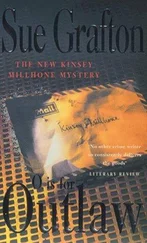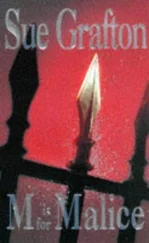“Got it. Sounds like you’re in the thick of things, which I can understand. Call when you come up for air, and we’ll have dinner.”
“Perfect.”
“Hey, Kinsey? You be careful with yourself. Whoever this guy is, he’s gotten away with murder now for thirty-four years. He’s not going to let you march in and blow it for him.”
“All I’m doing is a records search and after that, my job’s done. Trust me. I’m leaving any rough stuff to the sheriff’s department. That’s their bailiwick.”
After we hung up, I sat and thought about what he’d said. I knew he was right. I’d already had my tires slashed and that was before the car was unearthed and the bodies had been found. I unlocked the cabinet where I’d been keeping my handguns. I owned three. My favorite, a little.32-caliber semiautomatic my aunt Gin had given me as a kid, had been vaporized in an explosion that was meant to kill me. The next gun I acquired was a.32-caliber Davis that I bought because I liked the looks, thus opening myself to scorn and derision from all the gun nuts who considered it inferior. In deference to them, I bought an H amp;K P7 and an H amp;K P13, both serious weapons. The P13 was really more gun than I could comfortably handle, so I put it back in the cabinet with the Davis. I took out the box of Winchester Silvertips, loaded the P7, and put it in my shoulder bag.
I was now technically prepared, but far from feeling reassured, I was just flat scared.
I spent Sunday morning typing up my notes. After lunch I drove over to the office and sorted through the mail that was piled on the floor. The mailman had stuck so many envelopes through the slot that they’d spread out across the carpet like a welcome mat. I sorted through the bills and then had no choice but to sit down and write checks. I listened to my messages, which were surprisingly few; none required my immediate attention. On the way home I went by the post office and dropped my paid bills in the box at the curb. I spent the rest of the day cleaning my apartment-good therapy for those of us who cherish solitude. Scrubbing toilet bowls, you’re hardly ever troubled by others eager to pitch in.
Monday morning, I put my typewriter and all my notes in the car and drove into downtown Santa Teresa. I parked in the public lot across from the courthouse, put my handgun in the glove compartment, and locked my car. Everything I hoped to accomplish could be done in a two-block radius and none of it required me to be armed. My first stop was the title company on the corner. I was looking for information about Santa Maria property transactions in 1953. The original deeds are recorded and sent back to the new property owner, but photocopies are kept in the County Recorder’s office, quite possibly forever. The easiest way to get to them is to put in a request at the customer service counter at one of the local title companies. I do most of my business with Santa Teresa Title because their library is extensive and they’ll run a simple search without charge. Currently deeds are indexed according to the property address, but in the ‘50s, transactions were indexed by name. I asked the clerk for anything they could find for me under the names Jake Ottweiler, Chet Cramer, and/or Tom Padgett. She asked me to come back in an hour.
I crossed the street to the Hall of Records in the Santa Teresa County Courthouse. Since 1964 the estates of Santa Maria residents have been administered in the Santa Maria branch of the probate court, but in 1953 wills were filed at the courthouse here. I’d never thought of wills as hostile instruments, but I was in for a surprise. Cora Padgett’s will was straightforward. On her death on March 2, 1959, she’d left everything to Tom, making him a very rich man. The attached Exhibit A indicated that the real property, including a house and four funeral parlors, was valued at close to two million dollars. Her personal assets-cash, stocks, bonds, and jewelry-bumped the number up another three quarters of a mill. I paid the fee for a certified copy of her death certificate, which listed the cause of death as bilateral bronchopneumonia. Nothing iffy about that.
I moved to the wills of Calvin and Violet’s parents. Roscoe Wilcox died May 16, 1951, leaving a will that was signed and dated December 21, 1949. The will had been filed for probate on May 24, 1951, proved, the assets collected and identified, and the claims of the creditors paid. The terms were simple. Violet’s brother, Calvin Wilcox, was appointed executor. There were two specific bequests: the first, the sum of ten thousand dollars, which Roscoe left to his church, and a second, which read “To my daughter, Violet, in appreciation for the love and devotion she evidenced during our lifetime, the generous sum of one dollar, which is twice what she is worth.” All of his tangible personal property and the remainder of his estate he left “to my wife, Julia Faraday Wilcox, if she survives me, and if not, to my son, Calvin Edward Wilcox.”
Julia Wilcox, by the terms of her will, also signed and dated December 21, 1949, left everything to her husband or, in the event that he predeceased her, to her son, Calvin. The remaining provisions of both wills spelled out the attendant clerical details: inventory valuation, the payment of funeral expenses, debts, Federal and California taxes, and any claims made against the estate. Clearly Violet had been denied any expectation of money (save that one surly dollar) by reason of her indifference, lack of compassion, or abundant bad character. Chet Cramer had implied that Calvin stood to profit by her death, but since both wills predated her disappearance, Calvin was already in line to inherit everything and therefore had nothing to gain by killing her. He might have disliked her, but I couldn’t see why he’d risk his life or his freedom to get her out of his hair. Violet was a nuisance, but that was about it.
Hairl Tanner’s will was the eye-popper. He’d apparently drawn up a new one on July 6, 1953, thereby revoking all previous wills and codicils. He named a trust officer at his bank to be executor and established two trusts, one for Steve Ottweiler and one for Tannie. The trusts were to accumulate all income, with no distributions whatsoever, until the two reached twenty-five years of age. He further specified that his tangible personal property was to be similarly held in trust until each was twenty-five years old. I had to go back and read that provision again. Essentially what he was saying was that Steve wouldn’t have access to the money in his trust until 1962 and Tannie wouldn’t be eligible for her portion until 1969. The valuation of his personal property-art, silver, and antiques-was estimated at six hundred thousand dollars, but neither grandchild could sell, borrow against, or enjoy ownership for years. What was that about? At first I thought he was being punitive toward his two grandchildren, but then it occurred to me that Jake Ottweiler was the object of his wrath. Old man Tanner apparently wanted to make sure Jake couldn’t collect one red cent of his money even in support of his own two kids. Given the terms of Tanner’s will, Jake would have been forced to dig into his own pockets to cover his children’s expenses in addition to his own. Had Hairl made Jake the executor or a trustee, he might have at least petitioned for reasonable sums of money related to their health, welfare, and education. So how had Jake come up with his share of the purchase price of the Blue Moon?
While I was at the courthouse, I asked about DBAs, those being a record of applications for fictitious business names, hoping to pick up a tidbit or two about how they’d taken ownership. Unfortunately, an application expires five years from the date it’s filed and those files are purged after ten years; 1953 had long been relegated to the shredder. I tried the tax assessor’s office across the street, again hoping for information related to the Blue Moon, but the clerk told me the basement of the courthouse had flooded and any records prior to 1962 were lost. Some guys have all the luck. Here I was trying to pry into Jake’s business and I was having no success.
Читать дальше












